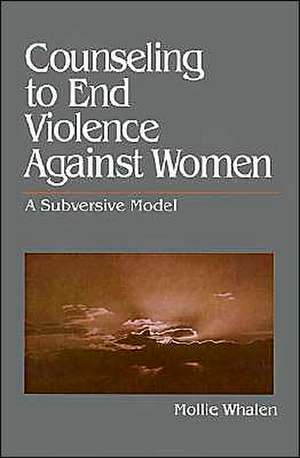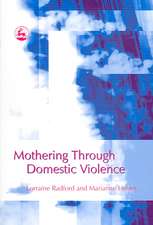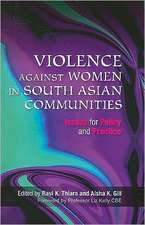Counseling to End Violence against Women: A Subversive Model
Autor Mollie Whalenen Limba Engleză Paperback – 29 mai 1996
| Toate formatele și edițiile | Preț | Express |
|---|---|---|
| Paperback (1) | 608.64 lei 6-8 săpt. | |
| SAGE Publications – 29 mai 1996 | 608.64 lei 6-8 săpt. | |
| Hardback (1) | 923.88 lei 6-8 săpt. | |
| SAGE Publications – 29 mai 1996 | 923.88 lei 6-8 săpt. |
Preț: 608.64 lei
Preț vechi: 716.05 lei
-15% Nou
Puncte Express: 913
Preț estimativ în valută:
116.46€ • 126.90$ • 98.14£
116.46€ • 126.90$ • 98.14£
Carte tipărită la comandă
Livrare economică 23 aprilie-07 mai
Preluare comenzi: 021 569.72.76
Specificații
ISBN-13: 9780803973800
ISBN-10: 0803973802
Pagini: 184
Dimensiuni: 154 x 229 x 12 mm
Greutate: 0.32 kg
Ediția:1
Editura: SAGE Publications
Colecția Sage Publications, Inc
Locul publicării:Thousand Oaks, United States
ISBN-10: 0803973802
Pagini: 184
Dimensiuni: 154 x 229 x 12 mm
Greutate: 0.32 kg
Ediția:1
Editura: SAGE Publications
Colecția Sage Publications, Inc
Locul publicării:Thousand Oaks, United States
Cuprins
Counseling and Social Change
Movements for Women's Liberation
Debated Issues in Feminism and the Emergence of Feminist Therapy
The Radical Potential of the Battered Women's Movement
Counseling Practice with Battered Women
Case Study
Counseling in Feminist Social Change Programs
Counseling to End Woman Battering
Carrying It On
Movements for Women's Liberation
Debated Issues in Feminism and the Emergence of Feminist Therapy
The Radical Potential of the Battered Women's Movement
Counseling Practice with Battered Women
Case Study
Counseling in Feminist Social Change Programs
Counseling to End Woman Battering
Carrying It On
Descriere
Feminist theory has viewed violence against women as being a result of a male-dominated society; however, traditional counselling approaches to helping battered women have neither addressed this view nor encouraged social change. The author of this challenging volume seeks to bridge this gap by incorporating feminist theory with counselling practice.
Whalen argues that a counsellor working with an abused woman should not aim merely to empower the client to change a situation that is intolerable for that particular woman: the counsellor should also aim to change the social conditions that foster abuse. The author's model focuses on women collectively seizing power and ending violence against all women.
















